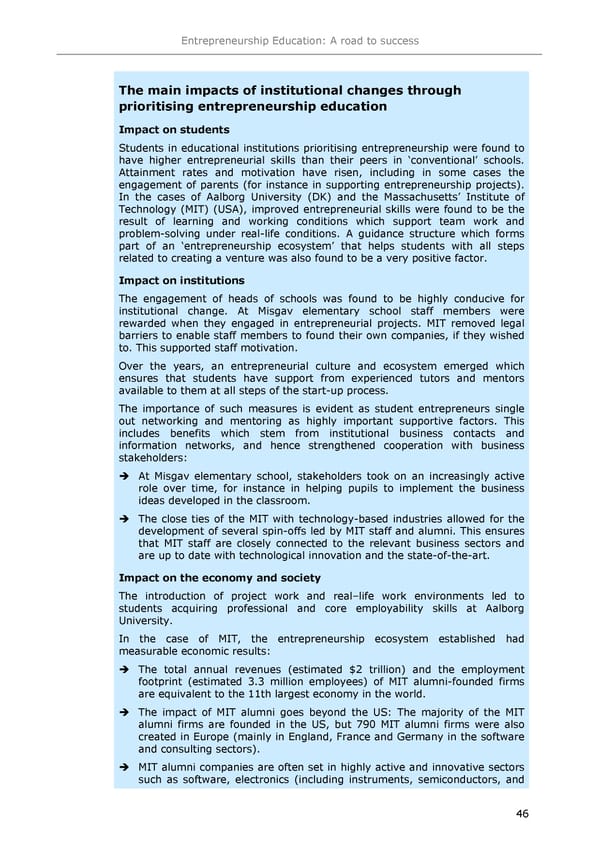Entrepreneurship Education: A road to success The main impacts of institutional changes through prioritising entrepreneurship education Impact on students Students in educational institutions prioritising entrepreneurship were found to have higher entrepreneurial skills than their peers in 8conventional9 schools. Attainment rates and motivation have risen, including in some cases the engagement of parents (for instance in supporting entrepreneurship projects). In the cases of Aalborg University (DK) and the Massachusetts9 Institute of Technology (MIT) (USA), improved entrepreneurial skills were found to be the result of learning and working conditions which support team work and problem-solving under real-life conditions. A guidance structure which forms part of an 8entrepreneurship ecosystem9 that helps students with all steps related to creating a venture was also found to be a very positive factor. Impact on institutions The engagement of heads of schools was found to be highly conducive for institutional change. At Misgav elementary school staff members were rewarded when they engaged in entrepreneurial projects. MIT removed legal barriers to enable staff members to found their own companies, if they wished to. This supported staff motivation. Over the years, an entrepreneurial culture and ecosystem emerged which ensures that students have support from experienced tutors and mentors available to them at all steps of the start-up process. The importance of such measures is evident as student entrepreneurs single out networking and mentoring as highly important supportive factors. This includes benefits which stem from institutional business contacts and information networks, and hence strengthened cooperation with business stakeholders: At Misgav elementary school, stakeholders took on an increasingly active role over time, for instance in helping pupils to implement the business ideas developed in the classroom. The close ties of the MIT with technology-based industries allowed for the development of several spin-offs led by MIT staff and alumni. This ensures that MIT staff are closely connected to the relevant business sectors and are up to date with technological innovation and the state-of-the-art. Impact on the economy and society The introduction of project work and real3life work environments led to students acquiring professional and core employability skills at Aalborg University. In the case of MIT, the entrepreneurship ecosystem established had measurable economic results: The total annual revenues (estimated $2 trillion) and the employment footprint (estimated 3.3 million employees) of MIT alumni-founded firms are equivalent to the 11th largest economy in the world. The impact of MIT alumni goes beyond the US: The majority of the MIT alumni firms are founded in the US, but 790 MIT alumni firms were also created in Europe (mainly in England, France and Germany in the software and consulting sectors). MIT alumni companies are often set in highly active and innovative sectors such as software, electronics (including instruments, semiconductors, and 46
 Entrepreneurship Education Page 49 Page 51
Entrepreneurship Education Page 49 Page 51